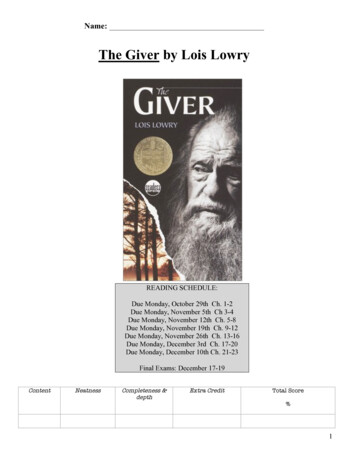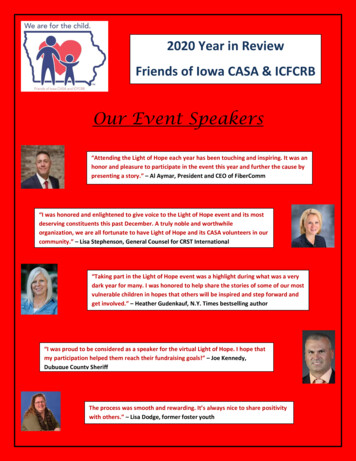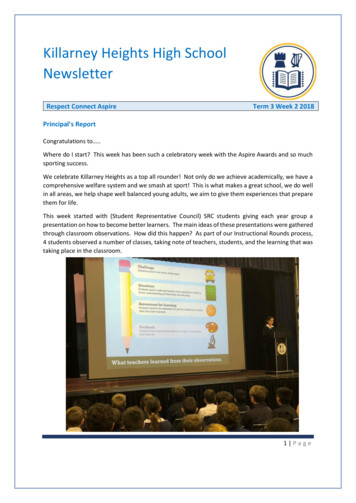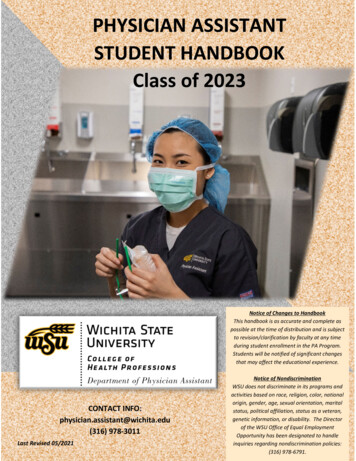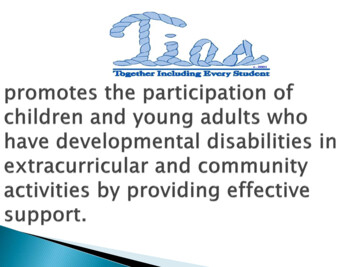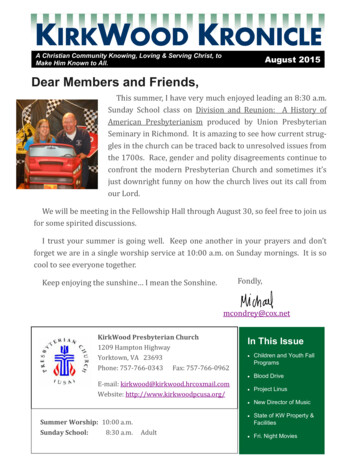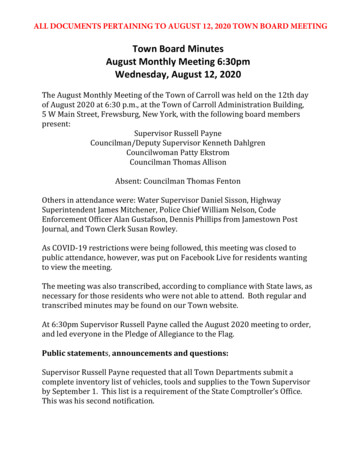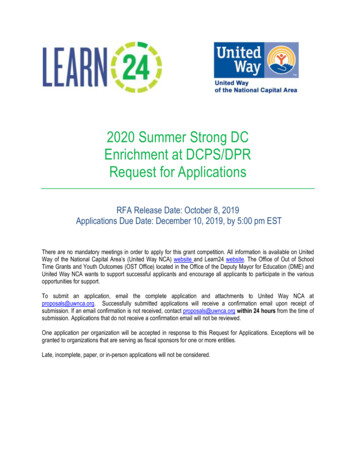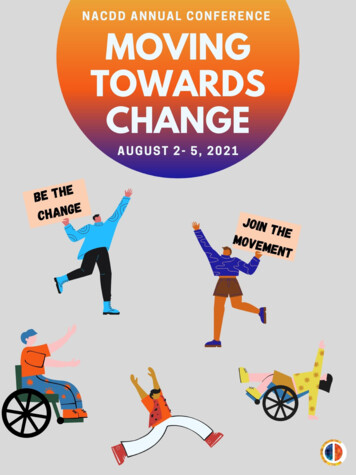
Transcription
Monday, August 2How the Biden-Harris Administration is Making Disability Rights a Priority2:15 p.m. — 3:15 p.m.Progress Towards Full Participation and Equity for People with DisabilitiesEmily Voorde, Associate Director, Office of Public Engagement, White HouseAlison Barkoff, Acting Administrator and Assistant Secretary for Aging, Administration onCommunity Living3:30 p.m. — 5:00 p.m.Reflections on the Administration’s Agenda with National Disability Organization CEOsCurt Decker, National Disability Rights Network (NDRN)John Tschida, Association of University Centers on Disabilities (AUCD)Julia Bascom, Autistic Self-Advocacy Network, ASANAngela Williams, EastersealsMike Brogioli, TASHMODERATOR: Donna Meltzer, NACDDTuesday, August 3How Congress is Making Disability Rights a Priority2:00 p.m. — 3:30 p.m.Creating a Legislative Roadmap for Disability Rights, Equity, and Inclusion for People withDisabilitiesPhoebe Ball, Disability Policy Counsel, House Committee on Education and LaborAmanda Lowe, Senior Disability Policy Advisor, Senate Health, Education, Labor, and PensionsCommitteeAlec Goldstone, Legislative Assistant, Rep. LangevinKim Musheno, Vice President, Policy, Autism SocietyCO-MODERATORS: Nicole LeBlanc and Erin Prangley, NACDD4:00 p.m. — 5:30 p.m.Concurrent Sessions: How DD Councils are working within their state to advance the rights ofpeople with disabilities on major issuesThree Council Strategies for Eliminating Sub-Minimum Wage
This session will discuss approaches to eliminating the use of 14c certificates in 3 states –Maryland, Colorado, and Hawaii. Maryland was the second state to pass legislation to phaseout the use of subminimum wage, and the phase out is not complete. Each state will discusstheir process, including different strategies and information that led to the successfullegislation and/or phase out. This is critical because people with disabilities want real jobs intheir communities with real wages, yet barriers exist. Since Maryland has completed its phaseout, we will also discuss data, outcomes, and next steps.Rachel London, MD DD CouncilSenator Jeff Waldstreicher, Vice-chair Senate Judicial Proceedings Committee (MarylandDistrict 18)Ken Capone, People on the Go of MarylandBob Lawhead, Colorado Developmental Disabilities CouncilMichael Hoover, Colorado self-advocateDaintry Bartoldus, Hawaii State Council on Developmental DisabilitiesStatewide Success on Leveraging Federal Funds for Students with I/DD in NewJerseyOn June 16, 2021, NJ Governor Murphy signed S3434, sponsored by State Senator DawnAddiego and Senate President Steve Sweeney, a bill that will help protect students withdisabilities from losing out on special education services because of the coronavirus crisis, bytemporarily extending the timetable for those who could exceed the age eligibility. The newpublic law would require boards of education to extend the educational and related servicesthe students are already entitled to in the 2020-21, 2021-22, and 2022-23 school years,protecting them from being “aged out” of eligibility when they turn 21.The New Jersey Council on Developmental Disabilities joined with its many collaborators,including the NJ Statewide Parent Advocacy Network (NJSPAN), the Education Law Center(ELC), the New Jersey Special Education Practitioners (NJSEP) and most importantly, familiesand legislators, in advocating for federal Covid response funding to be utilized for thisinitiative.Relevant to the theme of the conference “Moving Towards Change,” this session will focus onthe individual and collective first-hand experiences of key players in this advocacy effort. Itwill examine the motivations and determination of the many faces of change, who united in atruly collaborative and non-partisan manner to address a serious and outcome-threateningevent for students. It will also visit the identification of opportunities to effect changes inpolicy and the importance of communication as an essential component of advocacy.Leadership roles in advocates taking action will be emphasized.
Bob Titus, Public Policy Coordinator at New Jersey Council on Developmental DisabilitiesAssemblywoman Pamela Lampitt, Chair of the NJ Assembly Education CommitteeSubha Bolisetty, Parent of son currently transitioning from education to adult lifePeg Kinsell, Statewide Parent Advocacy NetworkRebecca Spar, Attorney Specializing Education LawVoting Rights and Accessibility—How the Disability Community is MovingTowards ChangeThe 2020 general election saw a wave of more accessible voting options for people withdisabilities due to the COVID-19 pandemic. Now that the election is over the ability to keepthese additional accessible options are being threatened throughout the country. Listen tonational disability advocates from SABE, NDRN, REVUP, and also the Texas DD Council tolearn how the disability community is advocating for more accessible voting and more voteroutreach to ensure that all people have an opportunity to cast their ballot.Lauren Gerken, Texas DD CouncilJack Rosen, NDRNRachita Singh, REVUP/AAPDEssie Pedersen, SABEDiana Mairose, SABEState Strategies to Protect and Expand HCBS in the Wake of COVID-19The COVID-19 pandemic has altered the lives of Americans with intellectual anddevelopmental disabilities (I/DD) on many levels, including the way people with I/DD receiveMedicaid home and community-based services (HCBS). State developmental disabilitycouncils (DD Councils) are critical to providing innovative solutions that will addressemergency threats to health, education, employment, and community living for people withI/DD during the pandemic and beyond.Medicaid has numerous waivers that allow for certain exceptions to Medicaid requirements.This session will focus on how to effectively advocate to your state Medicaid agency as theyconsider whether to maintain HCBS covered under emergency K waivers.Questions to be explored include:How did the pandemic change our state’s use of Medicaid waivers for the better?
What strategies are states using to protect HCBS services?What is the status of community services verses congregate settings with institutionalcharacteristics in different states?Tamara Jackson, NACDD Medicaid Taskforce Chair and Public Policy Analyst and LegislativeLiaison at Wisconsin Board for People with Developmental DisabilitiesWednesday, August 4Champions of Equal Opportunity Awards and Self-Advocacy Panel2:00 p.m. — 3:00 p.m.Champions of Equal Opportunity Awards Ceremony, sponsored by Optum3:15 p.m. — 5:00 p.m.Self-Advocacy Panel and Q&AMODERATOR: Eric Stoker, Utah DD CouncilLauren Gerken, Texas DD CouncilLindsey Spoon, Oklahoma DD CouncilWill Farrior, South Carolina DD CouncilRobert O’Mallan, Guam DD CouncilThursday, August 5Innovations by DD Councils: Sponsored By UHC2:00 p.m. — 3:30 p.m.Concurrent Sessions: Innovations and Lessons LearnedPeer Mentors for People with I/DD with Optum and the Michigan DD CouncilPeer support services are considered evidence-based by CMS and 39 State Medicaid plansreimburse peer support services for individuals with MI and/or SUD. Join representativesfrom Optum, Community Bridges, the Michigan Developmental Disabilities Council andDetroit Wayne Integrated Health Network as they share in-depth information aboutdeveloping peer mentoring training programs for individuals with I/DD and their thoughts on
the value that peer mentors can bring in supporting others to live self-determined and wellinformed lives.Dan Ohler, OptumKelly Friedlander, Community Bridges Consulting GroupTracy Vincent, Michigan Developmental Disabilities CouncilRobert Spruce, Detroit Wayne Integrated Health NetworkSexuality Education for People with I/DD: Two Statewide Models withElevatusPeople with developmental disabilities are often left out of the conversation about sexuality,almost as if they are incapable of having thoughts, feelings, and needs. In reality, they, too,are sexual beings that need information and skills for making healthy decisions aboutsexuality. People with disabilities have a higher rate of unplanned pregnancy, sexuallytransmitted infections, and sexual abuse than the general population and are less likely tohave receive any sexuality education. All people need the information and skills to makechoices about sexuality and relationship and to have relationships that are enriching and notexploitive.The Michigan Self Advocates as Sexuality Educators Project trains teams of self-advocatesand professionals to be sexuality educators. There are currently 26 teams in Michigan thatare presenting workshops on sexuality and relationships. This project is geared towardsadvocates taking action, being part of the solution, and learning leadership skills. You willhear from a self-advocate about their work in Michigan.The NY Relationship and Sexuality Training Project plans to host 13 trainings state-wide: 5 forself-advocate and professional teams on how to lead sexuality education classes, 4 forparents on leading parent workshops, and 4 staff training on leading staff training. Thisproject uses the self-advocates as sexuality educators, as well as two other peer educationmodels: parents of people with I/DD teaching other parents about how to talk aboutsexuality and relationships, and staff from schools and agencies teaching other staff how toaddress sexuality one on one.Both projects are teaming up with Elevatus Training to provide these trainings and materials.Each training supplies participants with curriculum to lead workshops and trainings. Thisworkshop is designed for other states to take action on providing sexuality education topeople with I/DD using a state wide training model which includes people with I/DD asworkshop leaders.Katherine McLaughlin, Elevatus Training
Mary Shehan-Boogaard, Michigan Developmental Disabilities CouncilAndre Robinson, Community Living ServicesKimberly Berg, NYS Developmental Disabilities Planning CouncilSupported Decision MakingMost people make multiple decisions every day. For individuals with disabilities, decisionmaking can be more challenging. They may need support to help them with their decisionmaking process. The Tennessee Center for Decision-Making Support is a new, virtualresource center that provides decision-making support information, resources, and tools toassist individuals with disabilities, their families and support providers when planning fortheir future. This center is designed to walk the user through a step-by-step process tounderstand and identify their unique decision-making support needs by using theinformation, resources and tools from the website.This session will introduce attendees to the Tennessee Center for Decision-Making Supportwith an overview of the Center and how to use it for future planning. Attendees will beguided on a virtual website tour that demonstrates how to utilize the resources and tools fordecision-making support planning. They will also learn of best practices and tools forsupported decision-making and how to use those tools to help individuals with disabilitieshave greater autonomy in the decisions for their life.Penny Johnson, Program Coordinator, TN Center for Decision-Making SupportCamron Hurt, Disability Rights Tennessee Supported Decision-Making ParalegalInnovations in Storytelling From the Georgia DD CouncilThis session gives councils knowledge on how they can make story collection and storytellinga tool for advocates to connect with elected officials at all levels for legislative advocacyefforts, for councils to showcase the diverse backgrounds and lives of people with disabilitiesin their states, for advocates to understand the power of their lived experiences when itcomes to leading the lives they choose.The presentation will cover work done in GCDD’s Storytelling Project. The initial goal of thatproject was to collect stories from people with developmental disabilities in each of Georgia’s56 Senate Districts to support legislative advocacy. That project, which began in 2017, hasresulted in a website of the stories and photos, a bound copy of the stories sent to Georgia’sSenate and House members, the Hidden Voices podcast (now in its second season), the 6,000Waiting short documentary, and most recently, the Treasure Maps Roadshow that includes a
film with 10 advocates telling their stories. These works not only support legislative advocacyefforts, but they also educate the public on the issues facing people with developmentaldisabilities and the work that GCDD does to increase opportunities for them and theirfamilies to thrive where they live, learn, work, play, and worship in Georgia’s communities.Maria Pinkelton, GA DD CouncilCriminal Justice and the School to Prison Pipeline with the PA DD CouncilThe PADDC sought to interrupt the “School to Prison Pipeline” by funding efforts to ensurethat students with disabilities have equal access to a quality education that can change theirtrajectory away from the “pipeline” and improve outcomes as students re-enter communityschools from the “pipeline.”This session will highlight two projects in Pennsylvania. The Institute on Disabilities at TempleUniversity presenters will share original video content produced in collaboration with activistyouth that brings awareness to the role that racism and ableism play in the school-to-prisonpipeline. Attendees will learn about (1) free, asynchronous and accessible digital trainingmaterials; (2) the historical and contemporary, local and global forces, which push children ofcolor and with disabilities out of their communities and schools into disciplinary schools,detention centers, jails, and prisons; and (3) strategies for building partnerships and engagingcommunities around triggering topics.In the second project by the Support Center for Child Advocates, a multi-disciplinary team willaddress the importance of considering educational reentry as part of the School-to-PrisonPipeline. Presenters will discuss their grant-funded work looking at obstacles that students inPennsylvania face when they reenter community schools from a residential placementthrough the juvenile justice, child welfare, or behavioral health systems. Presenters will sharerecommendations for improvement and the ways that their findings helped shape advocacymaterials for students and families, and a best practices guide for professionals.Lisa Tesler, PA DD CouncilK. Eva Weiss, Institute on Disabilities at Temple UniversityGrace Fay Cooper, Institute on Disabilities at Temple UniversityMorgen Black-Smith, Project for Youth Educational Success (Project YES!), Support Center forChild AdvocatesParris Boyd, Institute on Disabilities at Temple University
4:00 p.m. — 5:00 p.m.Closing PlenaryRepresentation Matters: Hollywood Moves Towards ChangeEmily Kranking, ActressAshley Eakin, Writer-DirectorLauren Applebaum, Respectability
SPEAKER BIOSAlison BarkoffAlison Barkoff was sworn into office as the Principal Deputy Administrator on January 20, 2021,and is currently serving as Acting Administrator and Assistant Secretary for Aging. In thiscapacity, she provides executive direction, leadership, guidance and coordination for ACLprograms nationwide and advises the HHS Secretary on issues affecting individuals withdisabilities and older adults.Ms. Barkoff comes to ACL from the Center for Public Representation, where she served asDirector of Advocacy. In that position, she led policy advocacy with federal agencies andCongress and legal advocacy nationally to advance community living and inclusion, including inthe areas of healthcare, Medicaid home- and community-based services, employment, housing,and education. She led and participated in numerous coalitions with disability and agingorganizations, including as co-chair of the Long-Term Services and Supports Task Force of theConsortium for Citizens with Disabilities. She has testified before Congress and the U.S.Commission on Civil Rights on disability rights and was appointed to serve on the federalAdvisory Committee for Competitive Integrated Employment of People with Disabilities.Ms. Barkoff previously served as Director of Advocacy at the Bazelon Center for Mental HealthLaw, where she worked on a range of disability, healthcare, education and civil rights issues. Inearlier government roles, she served as Special Counsel for Olmstead Enforcement in the CivilRights Division of the Department of Justice, leading efforts to enforce the rights of people withdisabilities to live, work and fully participate in their communities. She also worked with theCenters for Medicare & Medicaid Services within the Department of Health and HumanServices on policies related to Medicaid home- and community-based services and with theDepartment of Labor on issues affecting the workforce providing in-home services. She is asibling to an adult brother with developmental disabilities and has been involved in disabilityadvocacy her entire life. She received her undergraduate degree from Cornell University andher Juris Doctor from Emory University School of Law.Andre RobinsonAndre Robinson has been working at Community Living Services for nine years as a PeerMentor. He is a graduate of Central Michigan University with a Bachelor of Science degree inCommunity Development with an emphasis on Community Services. Andre became a sexualityeducator in 2018 working with the Wayne County team in Michigan.Ashley EakinBorn in California and raised in Nebraska, Ashley Eakin is a writer-director based out of LosAngeles with a physical disability. She was most recently selected for the Powderkeg FuseIncubator, curated by Paul Feig, in addition to the 2021 Commercial Directors Diversity
Program. Last year she was 1 of 8 women selected for the AFI Directing Workshop for Womenand her project SINGLE was selected for the 2020 SXSW Film Festival and received the SpecialJury Recognition Award. The film has played in over 30 festivals winning 7 awards and 2nominations. Eakin was also the recipient of the New York Women in Film Loreen ArbusDisability Awareness Grant. In 2020 Eakin was hired as a Staff Writer on an Animated Netflixseries, featuring a character with a disability. Prior to working on her own projects, in 2019Eakin worked for and shadowed Mark Pellington on the Quibi series SURVIVE filmed in theItalian Alps starring Sophie Turner and Corey Hawkins. Prior to this, Eakin was the assistant tofilm director Jon M. Chu. In 2017 she spent 5 months in Malaysia and Singapore working on hiscritically-acclaimed box-office hit CRAZY RICH ASIANS. Ashley has consulted on two projects forDisney.Bob LawheadBob Lawhead has served as Policy Advisor for the Colorado Developmental Disabilities Councilover the past five years. Prior to that, he led Community Link, a non-profit agency supportingthe inclusion of people with intellectual and developmental disabilities, for nearly 30 years. Hereceived his MA Ed. from the University of Colorado and is Past President of the NationalAssociation of People Supporting Employment First (APSE). Bob presently serves on APSE’sPublic Policy Committee and as Colorado APSE's Public Policy Chair. He also serves as Co-Chairof Colorado's Employment First implementation panel. He authored Conversion: FromSegregated, Sheltered Workshops to Supported Employment and serves on the Editorial Boardof the Journal of Vocational Rehabilitation. Bob has promoted inclusion for people withcognitive disabilities through parent education, systems change consultation and public policyadvocacy. He and his wife Anastasia have one child, Jess, who experiences Down syndrome andwho graduated from high school where he was included in regular classes. In late 2019 Jess washired by a local pizzeria to assemble delivery boxes and perform stocking duties and hasrecently returned to work following a pandemic-related furlough.Bob TitusBob Titus is a parent, guardian, and advocate for his son Joseph who is 39 years old and lives inthe community in a group home. Bob is a graduate of Montclair University (1976) and workedas an engineer for Verizon for 34 years, then as Public Policy Director for Autism New Jerseyand for the NJ Council on Developmental Disabilities since 2014. He currently serves as a boardmember for the Princeton Child Development Institute and as an officer for the Knights ofColumbus 636 Princeton.Camron HurtI am Camron Hurt. I grew up in Europe and relocated to Nashville when I was a teenager. I am aproud graduate of Tuskegee University where I received my bachelor’s degree in PoliticalScience and Sociology. After graduating undergrad, I moved to Hawaii to pursue my master’sdegree in diplomacy. I adopted my son and made my home in Hawaii for 7.5 years until I madethe move back to the south. My time in Tennessee has had me working not only in the legal
sector but also in education and civil rights, respectively. I am a proud member of Phi BetaSigma Fraternity Incorporated. In my free time I am the director of a soccer league, and a hugemovie buff. I am so proud and honored to work with Disability Rights Tennessee as a paralegalfor the Decision-Making Supports Division.Daintry BartoldusDaintry Bartoldus is the executive administrator of Hawaii State Council on DevelopmentalDisabilities, an agency which provides advocacy, capacity building, and systems changeactivities on behalf of persons with developmental disabilities. Daintry started with the Councilin 2012 as their Community and Legislative Liaison, moving into the Executive Administratorposition in 2017. Daintry’s first introduction to working with individuals with developmentaldisabilities started in 1989, working for The Arc in Hawaii, who played a key role in the closureof the state institution for individuals with intellectual and developmental disabilities (I/DD).Daintry was very active in educating the community on inclusion of individuals with I/DD. Shefilled various roles while at The Arc; working in group homes, creating new homes, apartmentsettings, working in day programs, supportive employment, and as the director of theIntermediate Care Facilities in the Community and the Medicaid Waiver program.Donna MeltzerDonna Meltzer is CEO of the National Association of Councils on Developmental Disabilities(NACDD), a national non-profit organization that supports the nation’s 56 governor-appointedDevelopmental Disabilities Councils that work within state government to promoteindependence, productivity, and integration of people with disabilities through systems changeactivities. In this capacity Ms. Meltzer oversees the organization’s public policy and advocacyagenda, as well as technical assistance to the members. Ms. Meltzer joined the NACDD inOctober 2012. Previously she was the Senior Director of Government Relations for the EpilepsyFoundation. She rejoined the Epilepsy Foundation in July 2005 after having previously workedfor the Foundation from 1987 – 1993. She also served as Director of Legislative Affairs for theAssociation of University Centers on Disabilities (AUCD) from 1995-2005. Ms. Meltzer began hercareer on Capitol Hill working for the Honorable Tony Coelho (D-CA), a former Congressmanand House Whip from California who is the father of the Americans with Disabilities Act (ADA)and a person with epilepsy. Ms. Meltzer also spent two years as the Government AffairsDirector for the National Health Council where she directed the advocacy agenda for theCouncil’s Voluntary Health Agency (VHA) members. She is a graduate of the University ofMaryland’s School of Journalism.Ms. Meltzer also provides tremendous leadership through multiple Boards and Coalitions. Sheis Immediate past president of the Board of Directors of the Coalition for Health Funding. She isalso a former Chair and former long-time member of the Board of the Consortium for Citizenswith Disabilities (CCD). She currently services on multiple Boards and Advisory groups including
for UnitedHealthCare’s National Advisory Board on Intellectual and Developmental Disabilitiesand the National Advisory Board for the College of Director Support/Direct Course.Emily KrankingEmily Kranking is an actress, advocate, and writer with cerebral palsy. Her first feature film isthe groundbreaking movie musical Best Summer Ever, in which she stars as the bubblycheerleader Nancy. It premiered in SXSW, gaining critical acclaim. She’s also currently aconservatory student in Washington, DC, and hopes to make it in musical theatre, television,and especially in animation as the first disabled Disney Princess. As an advocate, Emily iscurrently a Strategic Communications fellow at DC Developmental Disabilities Council (DDC).Previously, she was a Communications Consultant at National Association of Councils onDevelopmental Disabilities (NACDD) and a year-long fellow at RespectAbility in their Policy andHollywood Relations departments. Additionally, Emily was a participant in RespectAbility’sHollywood Lab program as an emerging scriptwriter. Her publications on disability have beenposted on RespectAbility, Yahoo, MSN, and The Mighty.Emily VoordeEmily Voorde was born in South Bend, Indiana. In utero, Emily was diagnosed withOsteogenesis Imperfecta. Since the age of 3, she’s been using a wheelchair to navigate our(albeit often inaccessible) world! Emily graduated from the University of Notre Dame in 2015with a degree in political science and minors in constitutional studies and business economics.At Notre Dame, Emily was an independent researcher with the Keough Dublin Summerprogram, an intern in the office of Mayor Pete Buttigieg, and an intern in Senator Joe Donnelly’sWashington DC office. Following graduation from Notre Dame, Emily participated in theAlliance for Catholic Education’s Teaching Fellows Program, a two-year program blending fulltime teaching in an under-resourced school with Masters of Education graduate coursework atthe University of Notre Dame. While with ACE, Emily taught in a second grade self-containedclassroom in Pascagoula, Mississippi.In 2017, Emily began a Masters of Public Policy in Education at Vanderbilt University’s PeabodyCollege. While in Nashville, Emily worked full time at Instruction Partners, an education nonprofit. Upon her graduation from Vanderbilt in May 2019, Emily joined Mayor Pete Buttigieg’sPresidential Campaign, Pete for America, as a Travel Manager. Her role quickly evolved asChasten Buttigieg, Mayor Pete’s husband, built out his own traveling road team. Emily spentthe remainder of the campaign in direct support of Chasten as his Body Woman and TripDirector. In August 2020, Emily joined the University of Notre Dame’s Sara Bea AccessibilityServices Team as their Assistant Director for Education and Outreach, supporting students withdisabilities through the COVID-19 pandemic. In May 2021, Emily was appointed to a role in theWhite House Office of Public Engagement as an Assistant Director and the Administration’sliaison to disabled Americans.
Erin PrangleyErin Prangley is Director of Public Policy at the National Association of Councils onDevelopmental Disabilities (NACDD), the national association for the 56 Councils onDevelopmental Disabilities across the United States and its territories. Ms. Prangley also servesas a Board Member of the Consortium for Citizens with Disabilities (CCD) and Co-Chair of theCCD Task Force on Developmental Disabilities, Autism and Family Supports. CCD is the largestcoalition of national organizations working together to advocate for federal public policy thatensures the self-determination, independence, empowerment, integration and inclusion ofchildren and adults with disabilities in all aspects of society.Prior to joining NACDD, Ms. Prangley was the Associate Director for Public Policy at theAmerican Association of University Women advocating for educational and economic equitywith an emphasis on diversity, equity and inclusion. Her extensive experience on Capitol Hillincludes serving as Deputy Chief of Staff for Congressman Brad Sherman (CA) and as aLegislative Assistant for Congresswoman Eleanor Holmes Norton (DC). For several years, Ms.Prangley also practiced employment, veterans’ benefits and immigration law representingclients in state and federal courts. Ms. Prangley is a graduate of the University of SouthernCalifornia (B.S. Sociology) and the American University Washington College of Law (J.D.).Grace Fay CooperGrace is a PhD Candidate in the department of anthropology at Temple University and currentlyworks as a graduate research assistant at the Institute on Disabilities, Pennsylvania's UniversityCenter for Excellence in Developmental Disabilities Education. At the Institute on Disabilities,Grace collaborates with the research and evaluation team on projects focused on culturally,linguistically, and structurally responsive service provision for individuals with disabilities.Grace’s dissertation is an ethnographic account of the lived intersections of immigrationprocesses and health care policy in Philadelphia’s Latinx immigrant community.Jeff WaldstreicherElected to the Senate in 2018, Senator Jeff Waldstreicher has been a member of the MarylandGeneral Assembly for four terms. He serves as Vice Chair of the Judicial ProceedingsCommittee. Throughout his legislative career, Jeff has been a leading advocate for justice andequality, especially for those with differing abilities. Jeff’s sister has autism spectrum disorder,making this issue deeply personal to him. He proudly sponsored and passed the “Ken CaponeEqual Employment Act,” which eliminated the sub-minimum wage here in Maryland. He alsoworked with stakeholders to end the Medicaid clawback for ABLE accounts. Professionally, Jeffis a practicing attorney who represents clients in complex litigation matters. Before striking outon his own, Jeff practiced at a large, international law firm. Jeff received his B.A. Phi Beta Kappafrom Emory University in Political Science and History and earned hi
Camron Hurt, Disability Rights Tennessee Supported Decision-Making Paralegal . Innovations in Storytelling From the Georgia DD Council. This session gives councils knowledge on how they can make story collection and storytelling a tool for advocates to connect with elected officials at all levels for legislative advocacy
